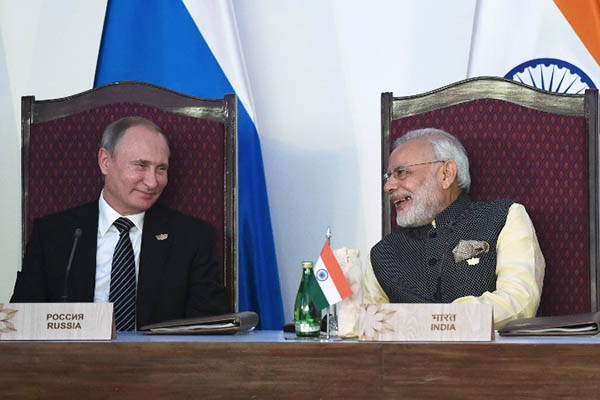
Prakash Singh—AFP
Vladimir Putin says Moscow wants to expand bilateral trade with New Delhi across ‘wide range of areas.’
Indian Prime Minister Narendra Modi and Russian President Vladimir Putin signed multi-billion dollar energy and defense pacts on Saturday following talks aimed at reinvigorating ties between the traditional allies.
Modi hailed Putin as an “old friend” after their meeting in the Indian state of Goa, where leaders of the other BRICS emerging nations were also gathering for a summit. “Your leadership has provided stability and substance to our strategic partnership,” Modi said alongside Putin at a beachside resort, after officials signed up to 20 agreements between the two nations.
Modi said the pacts on jointly producing light military helicopters, building frigates and other areas of cooperation “lay the foundations for deeper defense and economic ties for years ahead.” They also signed an initial agreement on India’s purchase of Russia’s state of the art defense system, capable of shooting down multiple incoming missiles, although there were no details on a timeframe for delivery.
India, the world’s top defense importer, is undergoing a $100-billion upgrade of its Soviet-era military, as it looks to protect its borders from rival Pakistan and an increasingly assertive China. But India has increasingly turned to the United States, and more recently France, rather than Russia, for its hardware, as Modi cultivates closer ties with Washington.
Putin has been seeking to seal deals with India to help revive Russia’s recession-hit economy, following sliding oil prices and Western sanctions over the Ukraine crisis. “I would like to stress that we intend to expand our bilateral cooperation not only in energy but also across a wide range of areas,” Putin said.
The announced energy deals include Russian oil giant Rosneft’s decision to buy almost the entire stake in India’s Essar Oil for almost $13 billion. Essar said the deal involving a group led by Rosneft was the largest single foreign direct investment in India.
The leaders also signed an agreement to supply more units to a nuclear plant in Kudankulam in southern India to meet the fast-growing economy’s thirst for electricity and to reduce its reliance on dirty coal. They discussed the threats posed by regional and “global terrorism” although it was not clear if this included India’s hiked tensions with Pakistan.
Putin was seen as unlikely to weigh into the dispute between the rival neighbors, as Moscow also eyes closer defense ties with Islamabad. Russia and Pakistan carried out their first joint military exercise last month.
The deal for Russia’s most modern air defense system has been in the pipeline for a few years, along with the helicopters, and the building of four frigates in India. New Delhi will purchase about 200 of the choppers to replace its ageing fleet under a joint venture over several years, with some manufactured in India, as it reduces its reliance on military imports.
“In the next few months, a place will be allocated [for manufacture] and there will be investments,” said Russian Trade and Industry Minister Denis Manturov.
India and Russia have traditionally held strong ties dating back to the 1950s after the death of Stalin. But trade has slipped beneath $10 billion since 2014, as Modi cultivates closer diplomatic and economic ties with Washington, while Russia eyes Pakistan and also China. Modi will hold talks with China’s President Xi Jinping late Saturday, also in the hope of boosting investment and trade. Relations however have been frustrated by Beijing’s decision so far to block New Delhi’s entry to a nuclear trade group, among other issues.
China and India, the world’s two most populous nations, are jockeying for regional influence in Asia. Modi will host a dinner for the leaders of the BRICS club, which also includes South Africa and Brazil, ahead of talks on Sunday.
BRICS was formed in 2011 with the aim of using its growing economic and political influence to challenge Western hegemony.
